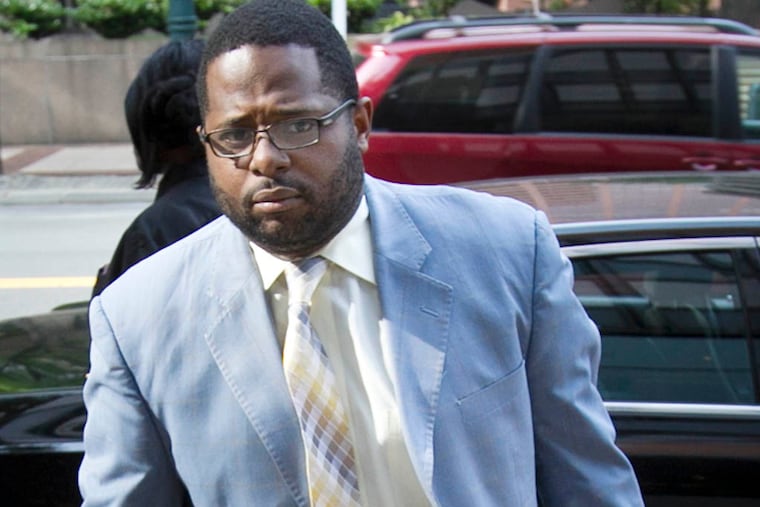Former Traffic Court judge Singletary gets 20 months
Pastor Willie Singletary, a former Philadelphia Traffic Court judge, rolled up to the federal courthouse Thursday with a tour bus filled with churchgoing supporters, wearing a dapper dark suit and with his vocal cords primed to deliver the sermon of his life.

Pastor Willie Singletary, a former Philadelphia Traffic Court judge, rolled up to the federal courthouse Thursday with a tour bus filled with churchgoing supporters, wearing a dapper dark suit and with his vocal cords primed to deliver the sermon of his life.
In a reach-to-the-rafters performance before U.S. District Judge Lawrence F. Stengel, the 33-year-old recounted his rise to the bench and pleaded for mercy in a preacher-like cadence while invoking everything from his thwarted childhood desires to play Nintendo to recent racial strife between the black community and police.
None of that, however, appeared to help Singletary - or, as his lawyer dubbed him, "Willie from West Philly" - in avoiding the 20-month prison term imposed for lies he told the FBI about the long-standing culture of corruption at Traffic Court.
"I just wanted to help people, and that's the God's honest truth," Singletary said, finger pointed skyward. "Nothing - nothing - and I mean nothing - in this world satisfies me more than when I help someone and know I helped someone."
Then, rising to his big finish, he turned to the audience, congregants from his Consolation Baptist Church in South Philadelphia.
"If you're here with me today and you believe in me, would you please stand?" he asked, eliciting "Amens" and "Hallelujahs" from the packed courtroom.
"We're asking you, Judge Lawrence F. Stengel, please have mercy on me."
Stengel was unswayed. He cited Singletary's long history of ethical lapses, failures to pay thousands he owed in court fines and child support, and the crime that led to his sentencing Thursday in handing down his punishment.
"How someone so unqualified for this office can be elected says more to me about the diseased political system that puts this person up for office than it does about Mr. Singletary himself," Stengel said.
It was one more cross to bear for Singletary, a self-described not-so-bright legal mind with a brief judicial career that flamed out almost as soon as it started.
He was one of four former Traffic Court judges convicted last summer of lying to authorities about their rampant ticket-fixing for friends, family and the politically connected.
But from the day he took the bench in 2008 at age 26, Singletary had already earned the disapproval of state judicial authorities for his 2007 pledge at a biker rally at Malcolm X Park to grant his "hookup" from the bench to anyone who donated to his campaign.
The $11,500 he owed in unpaid traffic tickets and fines surfaced later. As did the $19,000 he failed to pay in child support and the contempt of court charge he incurred over the debt.
It took a scandal in the form of photos of his genitals that Singletary shot and showed to a female court employee to prompt his resignation from the court in 2012. Stengel and lawyers in court Thursday appeared loath to describe that event as anything more than "the unfortunate incident."
Even after his unceremonious booting from the bench, Singletary's hits kept coming.
While under federal indictment in the ticket-fixing case, Singletary flashed his expired Traffic Court ID badge to a Cheltenham officer in hope of avoiding a traffic ticket.
Then, last month, the comedian John Oliver turned the spotlight back on the former judge in a segment railing against judicial elections on his HBO show, Last Week Tonight.
Oliver, as it happens, did not demur from confronting the "judicial penis" affair head-on.
Stengel, in court Thursday, cited the comedian's take, saying it should be played for law students for years to come as an example of how not to act as a judge.
Despite his less-than-distinguished record, Singletary's supporters rallied to his side. They described him as a man who had made mistakes but had proven himself throughout life as a role model for his community, mentoring dozens of young men and helping his mother kick a drug habit while fostering a burgeoning church community.
His lawyer, William J. Brennan Jr., lauded his client's rise from childhood poverty - with 21 siblings, six of whom were also named Willie - to the bench, as one of the youngest people ever elected to the city's minor judiciary, despite the fact that he had not earned more than a high-school degree.
Singletary, Brennan said, should not be held to the same standard as judges with years of experience and extensive legal training.
"There are ballplayers and then there are ballplayers. There are judges and then there are judges," he said. "A kid playing sandlot ball shouldn't be held to the same standard as someone playing in the World Series."
Stengel would later reply: "I believe Willie Singletary, very frankly, has very little respect for the law."